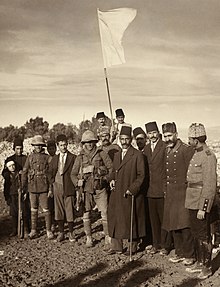British General Edmund Allenby Jerusalem 1917
..

وفي سنة 1917م وأثناء الحرب العالمية
الأولى قاد الجنرال البريطاني (أدموند أللنبي) ما يسمى (التجريدة المصرية)
في معركة غزة الثالثة، بعد أن فشل سلفه الجنرال (أرشيبولد ماري) في احتلال
غزة مرتين، وتمكن أللنبي من مفاجأة الحامية التركية في غزة والتي استبسلت
استبسال بطولي، وقام بعملية التفاف عليها من بئر السبع، واحتل غزة بعد أن
دمرت ، وسقطت مئذنة مسجدها العمري الشهير وتهدمت جدرانه. توجه الجنرال
اللنبي بعدها نحو القدس وتمكن من دخولها
..
This series of battles was successfully fought by the British Empire's XX Corps, XXI Corps, and the Desert Mounted Corps against strong opposition from the Yildirim Army Group's Seventh Army in the Judean Hills and the Eighth Army north of Jaffa on the Mediterranean coast. The loss of Jaffa and Jerusalem, together with the loss of 50 miles (80 km) of territory during the Egyptian Expeditionary Force (EEF) advance from Gaza, after the capture of Beersheba, Gaza, Hareira and Sheria, Tel el Khuweilfe and the Battle of Mughar Ridge, constituted a grave setback for the Ottoman Army and the Ottoman Empire.[2]
As a result of these victories, British Empire forces captured Jerusalem and established a new strategically strong fortified line. This line ran from well to the north of Jaffa on the maritime plain, across the Judean Hills to Bireh north of Jerusalem, and continued eastwards of the Mount of Olives. With the capture of the road from Beersheba to Jerusalem via Hebron and Bethlehem, together with substantial Ottoman territory south of Jerusalem, the city was secured. On 11 December, General Edmund Allenby humbly entered the Old City on foot through the Jaffa Gate instead of horse or vehicles to show respect for the holy city. He was the first Christian in many centuries to control Jerusalem, which is a very important site for many faiths. The Prime Minister of the United Kingdom, David Lloyd George described the capture as "a Christmas present for the British people". The battle was a great morale boost for the British Empire.[3]
..
معركة القدس (1917)
القدس، 9 كانون الأول/ ديسمبر 1917: ضباط صف بريطانيون من طلائع الكتيبة
219، من فوج لندن، يتقبلون استسلام مدينة القدس من رئيس البلدية حسين سليم الحسيني (الرابع من جهة اليمين، المتكىء على عصا). والثاني إلى يمين الصورة هو "أحمد شريف" فلسطيني كان يشغل منصب مفتش في الدرك.[1]
..



Comments
Post a Comment